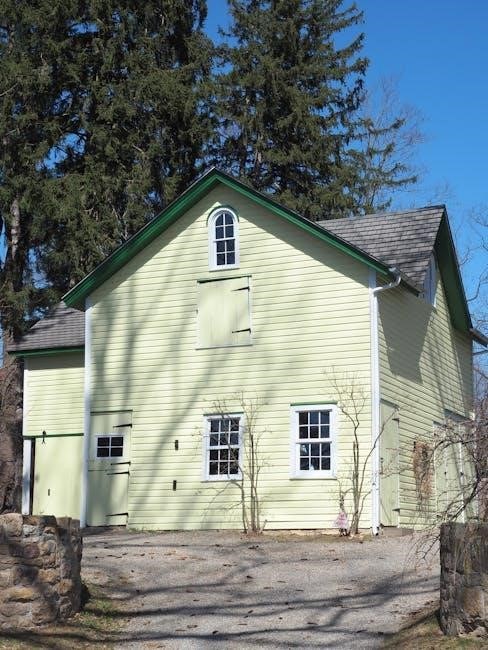pennsylvania residential pool regulations pdf
Pennsylvania residential pool regulations ensure safety, compliance, and environmental protection through the Uniform Construction Code, permits, and specific standards for installation and maintenance.
Overview of the Importance of Pool Regulations
Pennsylvania residential pool regulations are essential for ensuring safety, legal compliance, and environmental protection. These rules govern the installation, maintenance, and operation of pools to prevent accidents and health hazards. Compliance with codes like the International Residential Code (IRC) and Uniform Construction Code (UCC) is mandatory. Proper permits and inspections ensure adherence to safety standards, while fencing and barrier requirements protect users, especially children. These regulations also address water disposal and energy efficiency, promoting a safe and enjoyable environment for residents.
Scope of the Pennsylvania Residential Pool Regulations
Pennsylvania residential pool regulations cover the installation, maintenance, and operation of in-ground, above-ground, and on-ground pools, spas, and hot tubs. These rules apply to pools deeper than 24 inches, requiring permits, inspections, and compliance with the Uniform Construction Code and International Residential Code. They address safety standards, including fencing, depth requirements, and emergency equipment. Additionally, they regulate environmental aspects like water disposal and drainage, ensuring safe and lawful pool ownership and usage across the state.
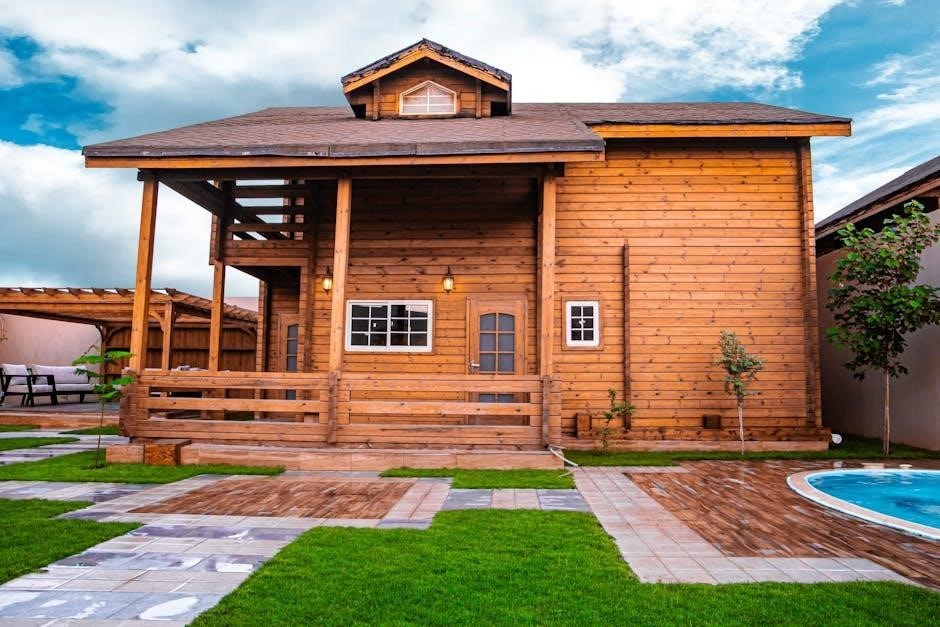
Key Components of Pennsylvania Pool Regulations
Pennsylvania pool regulations emphasize compliance with the Uniform Construction Code, International Residential Code, and Swimming Pool and Spa Code, ensuring safety, proper construction, and environmental protection.
Uniform Construction Code (UCC) Compliance
The Pennsylvania Uniform Construction Code (UCC) mandates that all residential pools, including in-ground, above-ground, and on-ground pools, must comply with specific safety and construction standards. A permit is required for pools deeper than 24 inches, and applications must include a plot plan showing setbacks. Compliance with Chapter 41 and Appendix G of the International Residential Code (IRC) is essential. Inspections ensure adherence to UCC standards, and manufacturers’ specifications must be followed; This ensures safe installation, operation, and environmental protection.
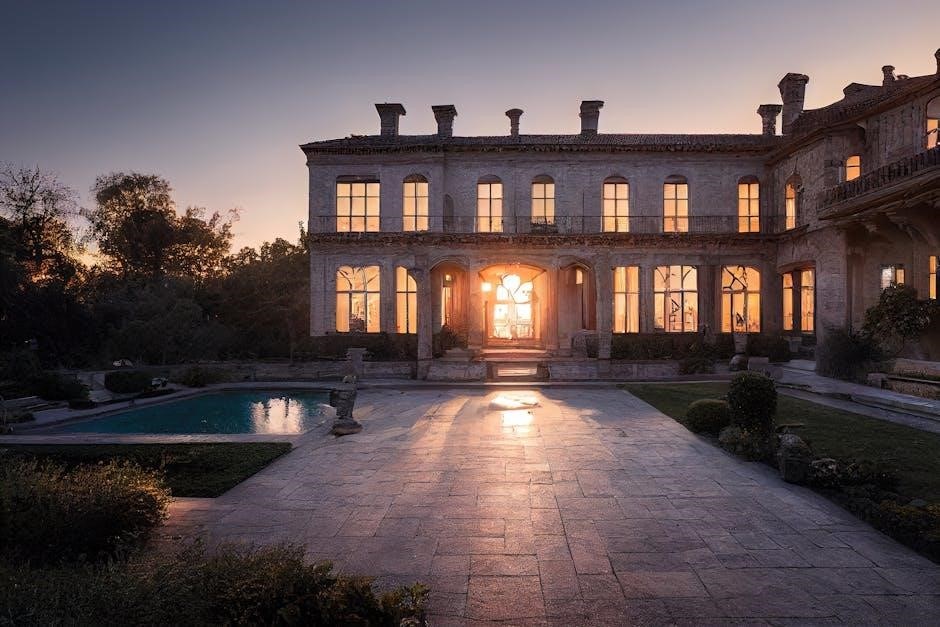
International Residential Code (IRC) Requirements
The International Residential Code (IRC) provides specific guidelines for residential pool installations in Pennsylvania. Chapter 41 and Appendix G of the IRC outline requirements for pool construction, safety barriers, and equipment. These standards ensure pools are built safely, with proper fencing, gates, and electrical systems. Compliance with IRC ensures consistency and safety, aligning with Pennsylvania’s Uniform Construction Code. Adherence to these codes is mandatory for all residential pools, hot tubs, and spas to ensure safe operation and regulatory compliance.
Swimming Pool and Spa Code Adherence
Compliance with the International Swimming Pool and Spa Code is mandatory in Pennsylvania. This code ensures pools, hot tubs, and spas meet strict safety and design standards. Requirements include proper barriers, electrical systems, and equipment installations. The code also addresses water quality, sanitation, and energy efficiency. Adherence to these standards is critical for ensuring safe operation and regulatory compliance, as outlined in the Pennsylvania Uniform Construction Code and local ordinances. Proper documentation and inspections are required to verify compliance.

Safety Standards and Requirements
Pennsylvania enforces strict safety measures, including fencing, barriers, and depth specifications, to prevent accidents and ensure compliance with residential pool regulations and codes.
Fencing and Barrier Requirements
Residential pools in Pennsylvania must be surrounded by a barrier at least 48 inches high, such as a fence or pool wall, to prevent unauthorized access. Gates must be self-latching and self-closing. The pool wall itself can serve as a barrier if it meets the height requirement. These measures ensure safety, especially for children, and comply with the International Residential Code (IRC) and local regulations. Proper fencing helps prevent accidents and fulfills legal requirements for pool ownership.

Pool Depth and Safety Equipment
Pennsylvania residential pool regulations specify minimum depth requirements for safe usage, varying by pool type. Safety equipment, such as ladders, stairs, and grab bars, must meet International Residential Code (IRC) standards. Pools deeper than 6 feet require additional safety measures, including handrails and rescue equipment. First aid kits and emergency signage are also mandated to ensure preparedness for accidents. These regulations aim to minimize risks and ensure a safe swimming environment for all users.
Emergency Procedures and Signage
Pennsylvania residential pool regulations mandate clear emergency signage and procedures to ensure rapid response to accidents. Signs must indicate pool depth, safety rules, and emergency contact information. First aid kits must be readily accessible near the pool area. A written emergency response plan, including evacuation routes and CPR instructions, is required for all residential pools. These measures are enforced to prevent accidents and ensure timely assistance when needed, aligning with state and local safety standards.
Installation and Maintenance Guidelines
Installations must adhere to manufacturer specifications and local codes. Regular maintenance ensures safety and longevity, with clear guidelines for equipment upkeep and water quality monitoring.
Permitting Process for Pool Installation
A permit is required for any swimming pool deeper than 24 inches. Applications must include a plot plan showing setbacks, pool specifications, and compliance with the Uniform Construction Code. A PA One Call serial number is mandatory to ensure underground utility safety. Submissions must also detail electrical and plumbing connections, with inspections scheduled upon completion. Above-ground pools may have simplified requirements, but all installations must meet local zoning and safety standards to obtain final approval.
Inspections and Compliance Checks
Inspections are mandatory to ensure compliance with Pennsylvania’s Uniform Construction Code and the International Residential Code. These checks verify proper installation of electrical systems, plumbing, and safety barriers like fencing. Inspectors review pool depth, equipment functionality, and barrier heights, ensuring they meet the required 48-inch minimum. Compliance certificates are issued upon passing all inspections, confirming the pool is safe for use and meets all regulatory standards.
Manufacturer Specifications and Warranty
Pool installations must adhere to manufacturer specifications to ensure compliance with Pennsylvania’s Uniform Construction Code. Equipment and materials must meet safety and performance standards outlined by the manufacturer. Warranties for pool components, such as pumps and filters, are typically required to guarantee durability and functionality. Documentation from manufacturers, including installation instructions and product certifications, must be provided during inspections to verify compliance with state and local regulations.
Electrical and Plumbing Requirements
Pennsylvania requires GFCI-protected electrical receptacles and proper plumbing connections for pools, ensuring compliance with the International Residential Code (IRC) and safety standards.
Electrical Wiring and GFCI Protection
Pennsylvania residential pool regulations require GFCI-protected electrical receptacles for all pool-related equipment, including pumps and convenience outlets, to ensure safety and prevent electrical shock. Wiring must comply with Chapter 42 of the 2018 International Residential Code (IRC) and the Pennsylvania Uniform Construction Code (UCC). Proper grounding and bonding of electrical components are mandatory to meet safety standards and prevent hazards associated with pool operations.
Plumbing Connections and Filtration Systems
Pennsylvania residential pool regulations mandate proper plumbing connections and filtration systems to ensure safe water circulation and treatment. All pool plumbing must comply with the Uniform Construction Code and IRC standards. Backflow prevention devices are required to protect potable water supplies. Piping materials and valves must be durable and resistant to corrosion. Filtration systems must meet manufacturer specifications and be designed to maintain clean and safe swimming conditions. Regular maintenance is essential to ensure system efficiency and compliance with health standards.
Heating and Sanitation Systems
Heating and sanitation systems for Pennsylvania residential pools must meet specific safety and efficiency standards. Electric or gas heaters are permitted, with GFCI protection required for electrical components. Sanitation systems must use approved disinfection methods, such as chlorine or bromine, to maintain safe water quality. pH levels must be regularly monitored and adjusted. Proper ventilation is mandatory for indoor pools to prevent gas buildup. All systems must comply with the Pennsylvania Uniform Construction Code and manufacturer specifications to ensure safe and efficient operation.

Environmental and Zoning Considerations
Pennsylvania residential pool regulations address environmental and zoning requirements, including water disposal, drainage, and setbacks from property lines to ensure compliance with local ordinances and environmental laws.
Setbacks and Property Line Regulations
Pennsylvania residential pool regulations require pools to maintain specific setbacks from property lines to ensure proper distancing. Swimming pools must not be located in front yards and must be set back at least 15 feet from any side or rear lot line. Above-ground pools typically require a 10-foot setback, while in-ground pools may have varying requirements based on slope and grade conditions. These regulations prevent encroachment and ensure safe drainage, adhering to local zoning laws and environmental standards.
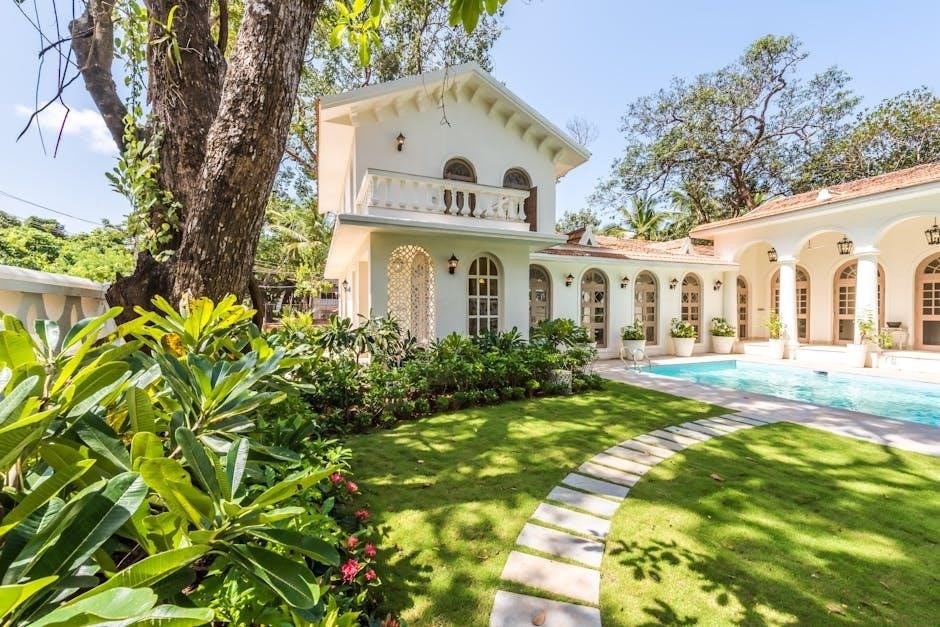
Water Disposal and Drainage Requirements
Pennsylvania residential pool regulations specify proper water disposal and drainage methods to prevent environmental contamination. Pool water must not be discharged into storm sewers or waterways without a permit, as per the Clean Streams Law. Discharge must comply with local and state environmental regulations, ensuring it does not create a nuisance. Pools must be installed according to manufacturer specifications, and drainage systems should direct water away from adjacent properties to maintain compliance and prevent erosion.
Landscaping and Noise Ordinances
Pennsylvania residential pool regulations include guidelines for landscaping and noise control to maintain community aesthetics and harmony. Pool areas must be landscaped to prevent erosion and ensure proper drainage, often requiring vegetative buffers. Noise ordinances regulate pool equipment operation, ensuring sound levels remain within acceptable limits to avoid disturbances. These requirements help integrate pools into neighborhoods while preserving environmental balance and neighborly tranquility.
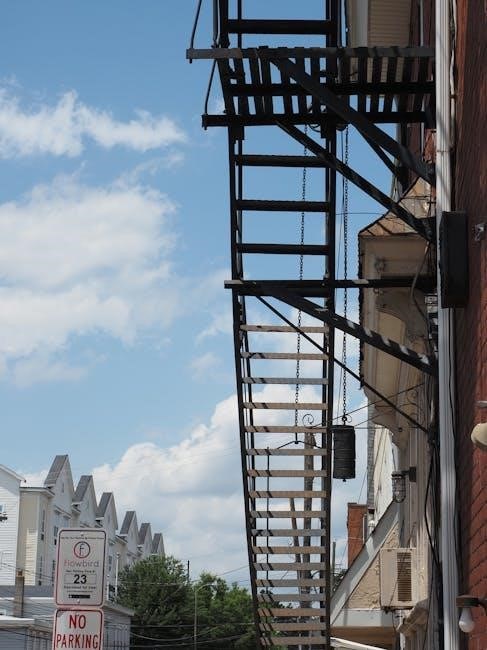
Legal and Compliance Aspects
Pennsylvania residential pool regulations require adherence to the Uniform Construction Code, permits, and inspections. Compliance ensures safety and structural integrity, with penalties for non-compliance.
Building Permits and Zoning Approvals
Building permits and zoning approvals are essential for pool installation in Pennsylvania. A plot plan showing setbacks must be submitted, ensuring compliance with local ordinances. The zoning permit fee is typically $25, while building permits vary based on pool complexity and size. Above-ground and temporary pools generally incur lower fees. Compliance with these requirements ensures legal installation and safety standards are met.
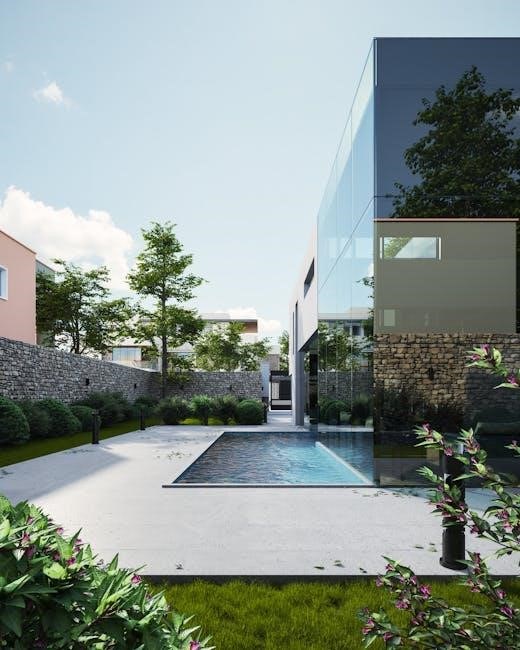
Annual Inspections and Renewals
Annual inspections are required for public swimming pools to ensure compliance with health and safety standards, while residential pools must adhere to specific renewal processes. Permits for residential pools may need periodic renewal, ensuring ongoing compliance with safety and zoning regulations. Homeowners must maintain proper documentation and address any issues identified during inspections to avoid penalties and ensure continued safe use of their pools.
Penalties for Non-Compliance
Non-compliance with Pennsylvania residential pool regulations can result in fines, legal action, and permit suspension. Penalties vary based on the severity of the violation, with repeat offenses leading to higher fines. Failure to address safety or environmental violations may result in mandatory corrections or pool closure. Compliance is strictly enforced to protect public health and safety, ensuring all pool installations meet state and local codes. Penalties aim to incentivize adherence to regulations and mitigate risks associated with non-compliant pool systems.
Resources for Pool Owners
Pennsylvania residential pool owners can access downloadable PDF guides, manuals, and contact local authorities for compliance assistance, ensuring adherence to safety and regulatory standards effectively.
PA UCC and Local Authority Contacts
Pool owners can access resources through the Pennsylvania Uniform Construction Code (PA UCC) and local authorities. The Residential Swimming Pool, Hot Tub, and Spa Guide provides detailed compliance standards. Contact local building departments for permits, inspections, and guidance. Authorities ensure adherence to safety and regulatory requirements, offering support for installation and maintenance. Visit official websites or call local offices for assistance.
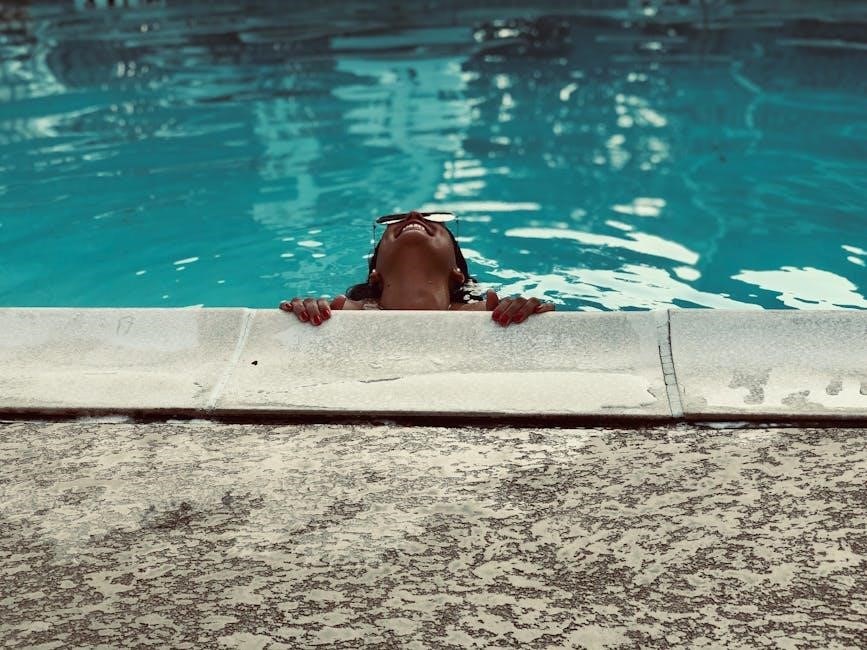
- PA UCC: Ensures statewide compliance and safety standards.
- Local authorities: Provide permits, inspections, and enforcement.
- Downloadable guides: Offer step-by-step installation and maintenance instructions.
Downloadable PDF Guides and Manuals
Downloadable PDF guides and manuals provide comprehensive details on Pennsylvania residential pool regulations. The Residential Swimming Pool, Hot Tub, and Spa Guide offers installation, safety, and maintenance standards. These resources, available from local authorities and the PA UCC, ensure compliance with state and local codes. They include checklists, diagrams, and detailed requirements for pool construction, fencing, and electrical systems. Visit official websites or local building departments to access these essential documents.
- Residential Swimming Pool Guide: Covers UCC and IRC standards.
- Pool Barrier Guidelines: Details fencing and safety requirements.
- Installation Checklists: Ensures compliance with local codes.
Professional Associations and Consultants
Professional associations and consultants play a crucial role in guiding homeowners through Pennsylvania residential pool regulations. Organizations like the Pennsylvania Swimming Pool Association offer resources, training, and expert advice. Consultants specialize in ensuring compliance with UCC and IRC standards, providing tailored solutions for pool installations. Their expertise helps navigate complex regulations, ensuring safety and legal compliance. Websites like weknowcodes.com provide detailed guides and manuals for professional reference.
